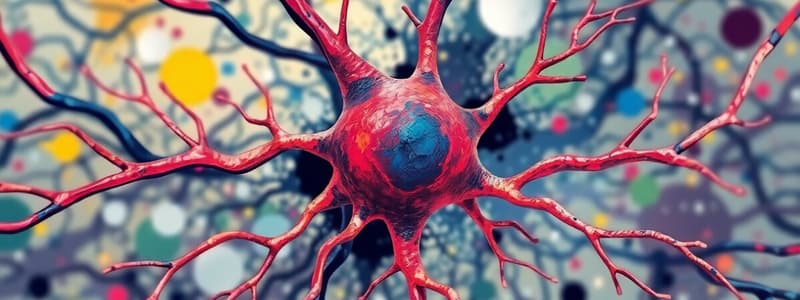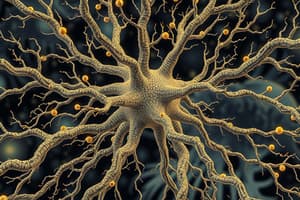Podcast
Questions and Answers
What is the primary function of neurons in the body?
What is the primary function of neurons in the body?
Which part of the neuron is responsible for receiving signals from other neurons?
Which part of the neuron is responsible for receiving signals from other neurons?
What role does the synapse play in neuronal communication?
What role does the synapse play in neuronal communication?
What does the axon of a neuron do?
What does the axon of a neuron do?
Signup and view all the answers
Which statement correctly describes how neurons work?
Which statement correctly describes how neurons work?
Signup and view all the answers
Which cranial nerve is responsible for smell?
Which cranial nerve is responsible for smell?
Signup and view all the answers
Which cranial nerve is primarily involved in controlling eye movement?
Which cranial nerve is primarily involved in controlling eye movement?
Signup and view all the answers
What function does the Vagus nerve (X) primarily control?
What function does the Vagus nerve (X) primarily control?
Signup and view all the answers
Which cranial nerve is associated with motor functions for the shoulders and neck?
Which cranial nerve is associated with motor functions for the shoulders and neck?
Signup and view all the answers
Which cranial nerve is involved in both sensory and motor functions regarding facial muscles?
Which cranial nerve is involved in both sensory and motor functions regarding facial muscles?
Signup and view all the answers
Which nerve is responsible for the ability to hear and maintain balance?
Which nerve is responsible for the ability to hear and maintain balance?
Signup and view all the answers
Which cranial nerve is primarily responsible for taste at the back of the tongue?
Which cranial nerve is primarily responsible for taste at the back of the tongue?
Signup and view all the answers
What is the primary motor function of the Hypoglossal nerve (XII)?
What is the primary motor function of the Hypoglossal nerve (XII)?
Signup and view all the answers
Which cranial nerve is associated with taste sensations from the front of the tongue?
Which cranial nerve is associated with taste sensations from the front of the tongue?
Signup and view all the answers
What is the primary function of the Vagus nerve (X)?
What is the primary function of the Vagus nerve (X)?
Signup and view all the answers
Which cranial nerve is primarily responsible for hearing and balance?
Which cranial nerve is primarily responsible for hearing and balance?
Signup and view all the answers
Which cranial nerve is associated with shoulder movement and head turning?
Which cranial nerve is associated with shoulder movement and head turning?
Signup and view all the answers
The Trigeminal nerve (V) is primarily involved in which of the following functions?
The Trigeminal nerve (V) is primarily involved in which of the following functions?
Signup and view all the answers
Which cranial nerve primarily controls pupil reaction and eye movement?
Which cranial nerve primarily controls pupil reaction and eye movement?
Signup and view all the answers
The cranial nerve responsible for controlling taste at the back of the tongue is which of the following?
The cranial nerve responsible for controlling taste at the back of the tongue is which of the following?
Signup and view all the answers
Which cranial nerve is primarily responsible for tongue movement?
Which cranial nerve is primarily responsible for tongue movement?
Signup and view all the answers
Flashcards
Neuron Function
Neuron Function
Neurons send messages between the brain and the rest of the body.
Dendrites
Dendrites
Branches of a neuron that receive messages from other neurons.
Axon
Axon
The long part of a neuron that sends messages.
Cell Body
Cell Body
Signup and view all the flashcards
Synapse
Synapse
Signup and view all the flashcards
Cranial Nerves
Cranial Nerves
Signup and view all the flashcards
Mnemonic for Cranial Nerves
Mnemonic for Cranial Nerves
Signup and view all the flashcards
Olfactory Nerve (I)
Olfactory Nerve (I)
Signup and view all the flashcards
Optic Nerve (II)
Optic Nerve (II)
Signup and view all the flashcards
Oculomotor Nerve (III)
Oculomotor Nerve (III)
Signup and view all the flashcards
Trochlear Nerve (IV)
Trochlear Nerve (IV)
Signup and view all the flashcards
Trigeminal Nerve (V)
Trigeminal Nerve (V)
Signup and view all the flashcards
Sensory Nerve Function
Sensory Nerve Function
Signup and view all the flashcards
Motor Nerve Function
Motor Nerve Function
Signup and view all the flashcards
Study Notes
Neurons
- Neurons are cells that send and receive messages in the body, enabling thinking, feeling, movement and breathing.
- Neurons function as tiny messengers, or wires, to transport information.
Neuron Function
- Neurons send signals/messages between the brain and the rest of the body.
- Example: Touching something hot triggers a neuron to signal the brain, causing a reaction to move the hand away.
Neuron Parts
- Cell body: The central hub, maintaining the neuron's health and function.
- Dendrites: Branch-like structures that receive messages from other neurons.
- Axon: The long wire-like structure that transmits messages from a neuron to other neurons or muscles.
- Synapse: The tiny gap between neurons, where messages are transmitted using chemical signals.
Neuron Processes
- Neurons communicate using electrical signals, then use chemical signals (across the synapse) to transmit between neurons, like a relay race.
Studying That Suits You
Use AI to generate personalized quizzes and flashcards to suit your learning preferences.
Description
Explore the fascinating world of neurons, the tiny messengers of the body. This quiz covers the structure and function of neurons, including their parts, signaling processes, and their crucial role in communication between the brain and the body. Test your knowledge on how these remarkable cells contribute to our ability to think, feel, and react.




